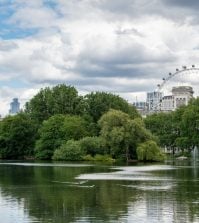Lack of ‘female perspective’ in No.10 led to women’s deaths during Covid, says former top UK civil servant

A lack of gender diversity among decisionmakers in the UK prime minister’s office meant that women were not adequately considered in pandemic-related policymaking, likely leading to preventable deaths, a former top official has told the Covid-19 inquiry.
Helen MacNamara was deputy cabinet secretary – one of the UK’s most senior officials – between 2020 and 2021. In a written statement submitted to the independent public inquiry into the UK government’s response to the pandemic she said the “exclusion of a female perspective led to significant negative consequences”, noting lack of thought for domestic abuse victims, pregnant women and around childcare in the context of school closures.
On what she described as a lack of provision for domestic abuse victims during the first lockdown, she wrote, “It is very difficult to draw any conclusion other than women have died as a result of this”.
“There was a serious lack of thinking about domestic abuse and the vulnerable, about carers and informal networks for how people look after each other in families and communities. There was not enough thinking about the impact on single parents of some of the restrictions,” she added.
She also wrote that there was a lack of guidance for pregnant women and that the “restrictions around birth and pregnancy care seemed unnecessarily restrictive and were comparatively slow to adapt”.
During the first lockdown from March 2020, some women were forced to give birth in hospitals without the father or a loved one present.
“Although I appreciated the need to keep hospitals as secure as possible I am sure there would have been kinder ways of managing pregnancy and birth especially given the differential clinical outcomes for women and their babies who become stressed,” MacNamara wrote.
She also noted a “disproportionate amount of attention” given to typically male pursuits – giving the examples of football, hunting, shooting and fishing – in terms of the impact of restrictions; and that her efforts to raise issues about personal protective equipment (PPE) not being designed to fit women’s bodies were ignored.
Female civil servants became ‘invisible overnight’
Giving evidence at a Covid-19 inquiry hearing on 1 November, MacNamara spoke of a “toxic environment” in which female civil servants found they had “become invisible overnight”. Meetings at Number 10 Downing Street were dominated by men and women were often spoken over or ignored, she said.
The inquiry has unearthed extraordinary WhatsApp messages between the ministers, political aides and civil service leaders at the heart of the pandemic response which include expletive-laden criticisms of each other.
Read more: Australia releases gender responsive budgeting guidance for federal departments
At the hearing, MacNamara was asked about a message sent from Dominic Cummings, then-prime minister Boris Johnson’s top aide, to Johnson and then-Downing Street director of communications Lee Cain. In the message, Cummings said he would “personally handcuff [MacNamara] and escort her from the building. I don’t care how it is done but that woman must be out of our hair” and went on to use, in MacNamara’s words, “violent and misogynistic” language about her.
“The way in which it was considered appropriate to describe what should happen to me, yes, as a woman, but, yes, as a civil servant, it is disappointing to me that [Johnson] didn’t pick [Cummings] up on the use of some of that violent and misogynistic language,” MacNamara said at the inquiry, adding “it is just miles away from what is right or proper or decent, or what the country deserves”.
Questioned at an inquiry hearing, Cummings denied his message was misogynistic and said he was “much ruder about men”.
MacNamara – who had previously been director general for propriety and ethics – has herself been the subject of controversy related to the pandemic, having been fined by police for attending a party at the Cabinet Office during lockdown. She apologised in April last year for her “error of judgement” and told the inquiry she had “profound regret” about her part in the ‘partygate’ scandal.
Read more: Breaking down the barriers: attracting women to male-dominated roles and professions























Another essential document with an important message for the long continuing problem of delivering gender and ethnicity diversity. Hopefully the debate will have a positive impact and result in achieving substantial change and improvement. The Covid enquiry must result in accountability and tangible improvements and not merely blame.